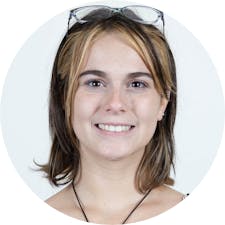Christian Blanco, a senior majoring in industrial engineering who identifies as Deaf, and Eryk Mejia, a senior majoring in psychology who identifies as deaf, are both officers of the ASU club deaf Devils — started to increase the presence of Deaf culture on campus and for students to get to know one another.
Two percent of students registered through ASU Student Accessibility and Inclusive Learning Services are d/Deaf or hard of hearing, said Chad Price, director of SAILS. Deaf students can receive accommodation through SAILS, including extended time on assessments, note-taking, Communication Access Realtime Translation, captioning and interpreters. Students who spoke to The State Press said despite the services SAILS provides, barriers continue.
"There are occasional instances where instructors are not cooperating with captioners, interpreters and SAILS to provide accommodations for students where necessary," Mejia said in an email. "Therefore, even with the best interests of the fantastic SAILS, some instructors are not nearly as committed to ensuring accessibility in the classroom."
'Uppercase D' Deaf describes individuals who are actively involved with and identify with their culture and the Deaf community. 'Lowercase d' deaf is used to describe the physical condition of hearing loss; a person who identifies as deaf may not have the strongest connection with Deaf culture and its community.
Hard of hearing is the most acceptable term for someone with some but not complete hearing loss. A person that identifies as hard of hearing may not use sign language.
Out of the entire ASU student population, approximately 1% of them are d/Deaf or hard of hearing.
"More exposure means more awareness of what it is like to be Deaf," Mejia said in an email. The club hosts coffee socials and events, such as movies, tailgates and game nights. You do not have to be d/Deaf or hard of hearing to join the club's events.
READ MORE: Video: Mask requirements strip away deaf students' ability to lip read
American Sign Language interpreters can be present during classes, meetings and other ASU events to interpret the information for students who request it through SAILS. Both Blanco and Mejia have used many of the resources through SAILS and find them beneficial for getting information from their class sessions.
Blanco believes that no further improvements are needed for d/Deaf accessibility and inclusivity on the ASU campus.
Not every student agrees. Mejia said, "despite the best efforts of SAILS, there are some barriers concerning how the individuals and entities (ASU housing and instructors) forgo these accommodations for their students because of laziness or because it is too complicated."
For housing, students registered with SAILS can ask for accommodations to be added to their dorm room or to be moved to a room prepared with accommodations like doorbells and smoke alarms with flashing lights, Price said.
Most of the residential halls on all four ASU campuses have some rooms provided for students who are d/Deaf or hard of hearing. Tooker House, Price said, is currently one of the best set-up residential halls for accommodations due to it being a newer building.
For school events, students must inform SAILS that they wish to attend and SAILS will set up an interpreter or captioning for the students. For sports events, there is closed-captioning on the big screen.
But not every event receives the same accessibility.
"Events, housing, resident advising meetings, student-run meetings and such on campus is rarely provided an interpreter or such services," said Austin Cary, an ASL instructor who identifies as deaf, in an email.
Cary said interpreters often will not sign for the duration of the event but instead provide a summary at the end.
"Let's say the meeting was an hour long. They would summarize the information in five to ten minutes. How much information was left out? Deaf students don't know," Cary said.
"What I believe would be a fantastic start (to improve accessibility on campus) would be requiring closed captioning for every video on the ASU website," Cary said. "Provide workshops or training to help instructors/educators/video producers to learn how to add closed captioning to their videos. I think this is so critical because once you establish the captioning. It is much easier to translate to different languages to meet accessibility for different language speakers."
Price encourages that if there are accessibility issues on campus to please let SAILS know so "we can take some action to make sure that it becomes accessible."
"I remember a few notable instances where classmates, friends, or co-workers — who were aware of how others may take advantage of my deafness — stood up for me," Mejia said. "I believe this was because they realize how important it is for us to access the same resources and information that others do."
Blanco said it's important for others to be aware that Deaf individuals have a culture and that they share the same abilities as others who are not d/Deaf or hard of hearing.
"I would love to encourage people to take ASL courses because of my experience as a deaf individual with hearing exposure all of my life," Cary said. "Some were awesome experiences, some were not so great. Which is why I wanted to help educate and help raise awareness about ASL and the Deaf culture."
Edited by Jasmine Kabiri, Wyatt Myskow, Sophia Balasubramanian and Kristen Apolline Castillo.
Reach the reporter at ksaba1@asu.edu and follow @KylieGirlWrites on Twitter.
Like The State Press on Facebook and follow @statepress on Twitter.

Kylie is a senior studying political science with a minor in english literature. This is her third semester with The State Press. She has also worked at The Arizona Capitol and in Ireland.




